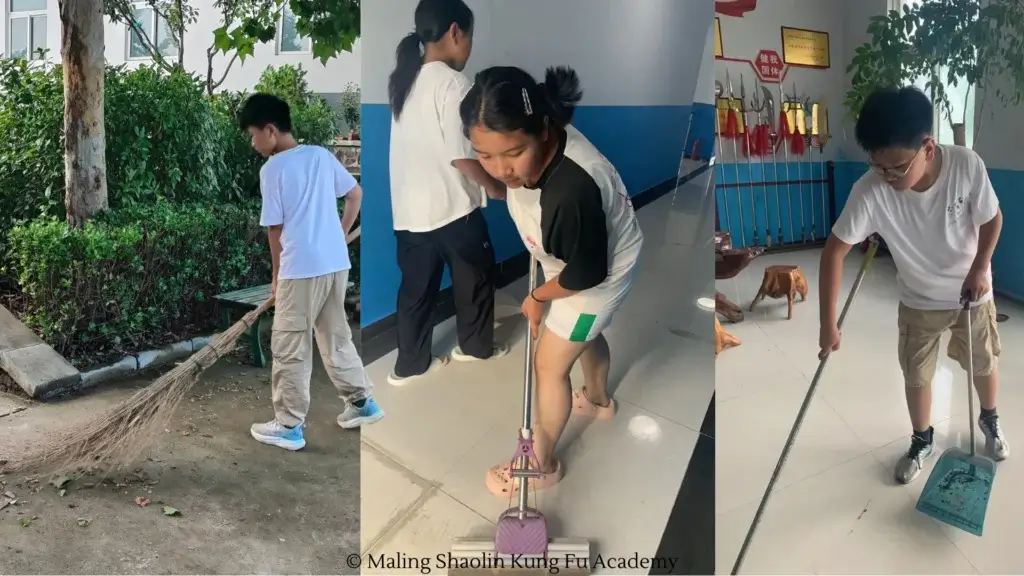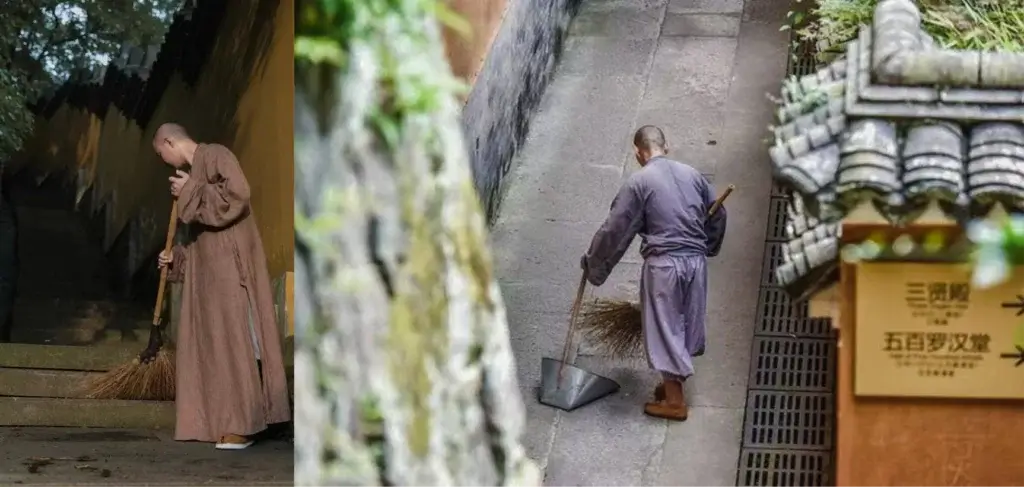
In many Asian countries, including China, student participation in school cleaning is a well-established tradition. This practice, often observed in educational institutions from primary schools to universities, involves students taking on the responsibility of cleaning their classrooms and shared spaces. While this tradition may be familiar to many through popular depictions of Japanese culture, such as in anime, it is also a significant aspect of school life in China and other Asian countries. This article explores the purpose, benefits, and cultural significance of this tradition, with a particular focus on China.
The Tradition of Student Cleaning in China

In China, the practice of students cleaning their schools is deeply ingrained in the educational system. Traditionally, students were expected to participate in cleaning activities daily, but in recent years, many schools have shifted this responsibility to specific days, commonly Fridays. This transition reflects a balance between maintaining the tradition and adapting to modern schedules and academic demands.
Typical Cleaning Duties:
Students are typically assigned various cleaning tasks, including sweeping and mopping floors, wiping down desks, cleaning blackboards or whiteboards, emptying trash bins, and maintaining cleanliness in shared spaces such as hallways, restrooms, and playgrounds. These tasks are often organized on a rotational basis, ensuring that every student contributes equally.
Purpose and Rationale:
The primary purpose of involving students in cleaning activities is to instill a sense of responsibility and discipline. By taking care of their immediate environment, students learn the importance of cleanliness, hygiene, and community service. This practice is not merely about maintaining a clean school; it is also an educational tool that teaches valuable life skills and values.
Cultural and Educational Significance
The tradition of student cleaning is rooted in several cultural and educational principles:
- Collective Responsibility and Community Spirit:
In many Asian cultures, including China, there is a strong emphasis on collective responsibility. By participating in cleaning activities, students learn to contribute to the well-being of the entire school community. This fosters a sense of belonging and teamwork, as students work together to maintain a clean and pleasant environment. - Discipline and Work Ethic:
Regular participation in cleaning tasks helps cultivate discipline and a strong work ethic. Students learn to adhere to schedules, complete tasks efficiently, and take pride in their work. This discipline extends beyond cleaning and can positively impact their academic and personal lives. - Respect for Labor:
By taking on cleaning duties, students gain an appreciation for the work that goes into maintaining cleanliness. This experience fosters respect for those who perform similar tasks professionally, whether in schools or in broader society. It also emphasizes the dignity of all forms of work, regardless of the nature of the task. - Environmental Awareness:
The act of cleaning their environment makes students more conscious of waste and environmental issues. They become more aware of the consequences of littering and are more likely to adopt environmentally friendly practices, such as recycling and reducing waste.
The Practice in Other Asian Countries
While the focus here is on China, similar practices exist in other Asian countries, albeit with variations. In Japan, for example, student cleaning is an integral part of school life, with students taking turns cleaning classrooms, hallways, and other shared spaces. This practice is widely recognized and has been popularized through various media, including anime.
In South Korea, student cleaning is also common, though the specifics can vary from school to school. In both countries, the emphasis on community service, responsibility, and respect for one’s environment is similar to the values upheld in China.
Cleaning Practices at the Shaolin Temple: Discipline and Devotion

The Shaolin Temple, renowned as the birthplace of Chan (Zen) Buddhism and Shaolin martial arts, has long been a symbol of discipline, spirituality, and rigorous training. Alongside their intense martial arts and cultural training, disciples at the Shaolin Temple engage in regular cleaning duties, which play a crucial role in their daily routine and spiritual practice. These cleaning practices are an integral part of the monks’ and students’ lives, reflecting the temple’s values of simplicity, humility, and mindfulness.
Daily Cleaning Routines:
As recounted by practitioners, the daily life of a Shaolin disciple is highly regimented. The day typically begins at 5:20 a.m., with disciples quickly dressing and attending to personal needs before gathering for morning stamina training. After this physically demanding session, they have breakfast and then attend to the cleaning of their dormitories. This morning cleaning involves tidying personal spaces, sweeping floors, and ensuring that living areas are neat and orderly. This routine instills a sense of responsibility and mindfulness, as each disciple must take care of their surroundings and respect the communal living space.
Weekly Cleaning Day:
In addition to daily cleaning, there is a designated “cleaning day” at the Shaolin Temple, typically occurring once a week. While this day provides a break from the rigorous training regimen, it is not a day of complete rest. Instead, it is dedicated to more thorough cleaning tasks. Disciples are responsible for washing their accumulated dirty clothes, bed sheets, and quilt covers by hand, as modern conveniences like washing machines are often absent. This manual labor reinforces the values of self-reliance and simplicity, reminding disciples of the importance of humility and the traditional ways of life.
Philosophical and Spiritual Significance:
The practice of cleaning at the Shaolin Temple is deeply intertwined with Chan Buddhism’s emphasis on mindfulness and presence. Every action, including cleaning, is seen as an opportunity for meditation and self-cultivation. The meticulous care given to maintaining cleanliness reflects the Buddhist principle of cultivating purity in one’s mind and actions. By performing these tasks with attention and care, disciples practice mindfulness, focusing fully on the present moment and the task at hand.
Moreover, the act of cleaning is a form of service to the temple and its community, embodying the spirit of selflessness and communal responsibility. It aligns with the Buddhist teaching of “right action,” one of the elements of the Noble Eightfold Path, which encourages actions that are morally wholesome and beneficial to oneself and others.
Historical Context and Continuity:
Historically, the Shaolin Temple has been a place of not only martial discipline but also cultural and spiritual education. The tradition of cleaning has been passed down through generations of monks and disciples, remaining a constant in the temple’s evolving practices. This continuity underscores the importance of maintaining a simple and disciplined lifestyle, regardless of the changing times.
In recent years, the Shaolin Temple has become a major cultural and tourist attraction, drawing visitors from around the world. Despite this influx, the tradition of cleaning and the values it represents continue to be upheld, ensuring that the temple remains a place of spiritual cultivation and practice.
Cleaning at Our Academy
At Maling Shaolin Kung Fu Academy, we also uphold the tradition of weekly cleaning, which takes place every Friday. This practice is an integral part of our school culture and is expected of all students upon their arrival. The cleaning duties are divided among students and include maintaining common areas such as training spaces, restrooms, showers, hallways, the laundry room, and outdoor training grounds. This routine not only helps keep our environment clean and orderly but also instills a sense of responsibility, discipline, and community among students, reflecting the values and principles inherent in our training.
Conclusion
The tradition of student cleaning in China is more than just a practical measure for maintaining school cleanliness; it is a valuable educational tool that imparts essential life skills and values. By participating in these activities, students learn about responsibility, discipline, community service, and respect for labor. As schools continue to adapt this tradition to modern times, it remains an important aspect of holistic education, fostering not only academic growth but also character development and social responsibility.





